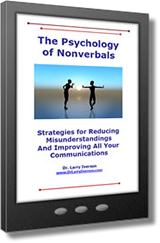Handle It – Dealing with Criticism and Negative Feedback (Part 1)
Order and download this entire nine-part audio program.
Have you ever had someone pick on you? Or be sarcastic towards you or blame you for something you did, or maybe didn’t do? Have you ever had people give you a hard time about things? How much do most of us like criticism? Not too much. Yet it comes with life.
Would knowing how to influence others to take action be of benefit to you?
Learn more »
What we need to do is to move ourselves forward and find ways of coping and dealing with it so that it doesn’t push our buttons or knock us off our game. Staying in control over yourself is one of the most important elements of being your best and staying at your peak personally and professionally.
Criticism is a Negative Vortex
There are a few sayings that stand out to me when thinking of criticism and conflict. Elbert Hubbard said, “To avoid criticism do nothing say nothing, be nothing.”
Once I also heard an acronym for “CRAP”.
C.R.A.P. >>>
C > criticism,
R > rejection,
A > antagonists,
P > pressure.
You have to find a way to persist through crap, because these four things will undoubtedly happen to you.
Dr. Seuss once said, “I’ve heard there are troubles of more than one kind. Some come from ahead and some from behind. But I brought a big bat, I am all ready you see, now my troubles are going to have troubles with me!”
Staying Unplugged
When we are in conflict we say things we don’t mean to, and sometimes we mean things we don’t say. Only rarely do we communicate at a real and deep level what we really honestly feel and think.
We seldom speak from our honest values center, or expose our most vulnerable aspects of being in such a way that the other person can really hear us and get what we are saying.
Why do we fall into this trap? Why is it so difficult to do what we know is right or to proceed in the way that we know we have to proceed? Being criticized or having a conflict has the capacity to confuse and mesmerize us and we come to believe that there is no way out other than to do battle.
Conflict poses a dark engaging and destructive power:
– the power of attachment when it’s time to leave,
– the power of resentment when it’s time to forgive,
– the power of speaking when it’s time to be silent or listen.
Conflict alternately strokes and crushes our egos. It fuels and exhausts our will. It energizes us and freezes us in our tracks in fear. It speaks to a very deep, ancient part of us that desires power and sometimes delights in get backs for those people we think we have been offended by.
When we engage in interpersonal conflict, our emotions become enormously powerful and quite overwhelming sometimes. When we experience strong emotions they often feel limitless, unstoppable, irresistible, and at times can be all defining of who we are, our personality, and the ways we behave.
Part of the seduction of these strong emotions is: 1) it prods us to define ourselves n very absolute terms; 2) we begin to identify with the seemingly infinite power of those feelings; and 3) we begin to surrender our self control to a fight or flight urge.
Surprisingly, large scale change and development can be achieved through fairly simple action. To do this though requires you to take responsibility for your part of the situation. It necessitates, that you are personally accountable for your part in the conflict experience. There are no magic wands, but there are many effective tools, techniques, methods, approaches, questions and mental states. Yet these will be different for each person in various situations.
What really matters is your search for what works for you right now, with this person, this situation, the place where you are in conflict.
(to be continued…)
Has this program caught your interest? Just can’t wait to hear the next segment? Or perhaps you’d like to download the entire program to your phone or tablet and listen during your travels? You can purchase and immediately receive this entire program as a digital download. Order Now: Dealing with Criticism
 The Psychology of Nonverbals
The Psychology of NonverbalsStrategies For Reducing Misunderstandings And Improving Your Communications. Becoming an exceptional communicator is a learned skill. Would knowing how to influence others to take action be of benefit to you? Do people ever misunderstand what you say? You can end that now. Learn the psychology of nonverbal language. Since over 90% of communication meaning is not from the words themselves, make your vocabulary work even better through applying the power of the 9 core aspects of nonverbals.
Posted: December 7th, 2016 under Audio Programs.
Tags: antagonists, conflict, Criticism, criticized, ego, fear, fight, mental state, negative, rejection, resentment, sarcastic, seduction, self control







